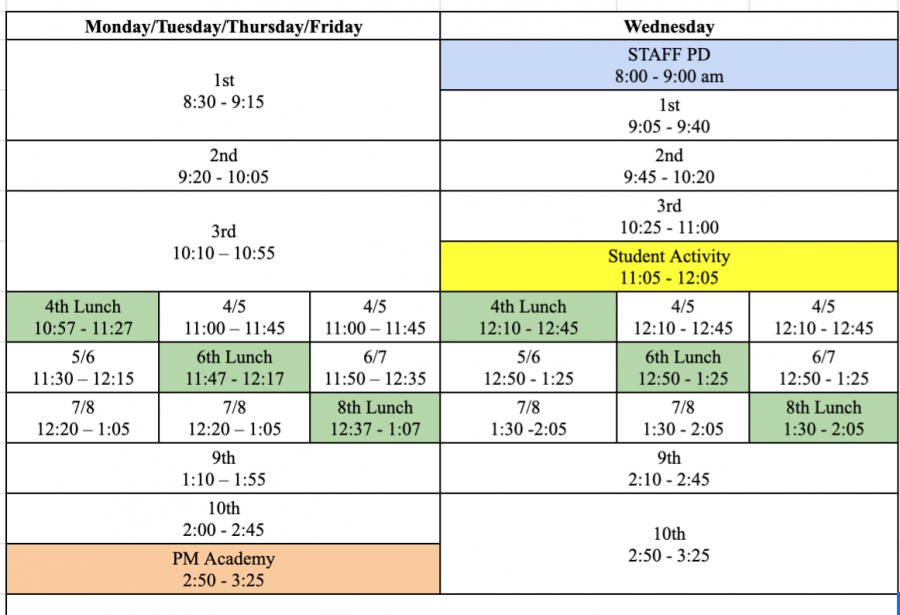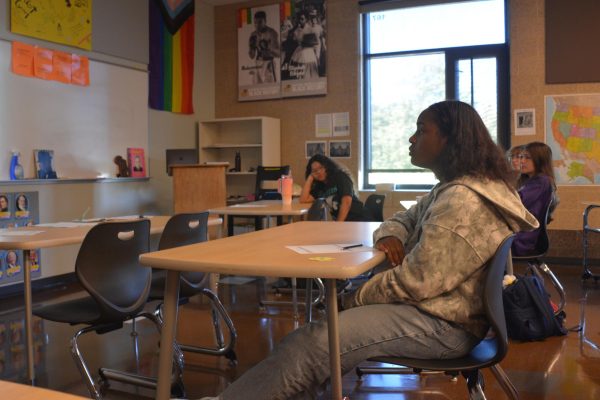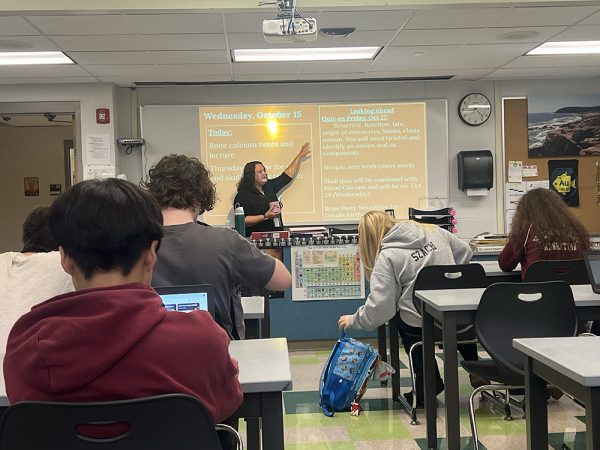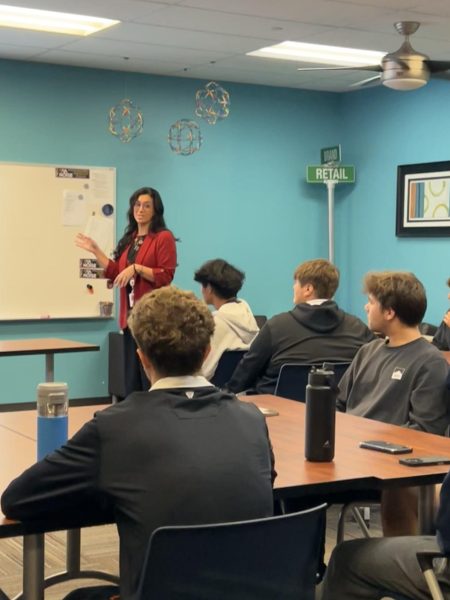New Schedule Brings Later Start Time, No Block Periods
The pandemic changed a lot of things last year, including our schedule.
This year’s schedule reverts to a pre-COVID five day week schedule with a few major changes. Though everyone’s happy to be back in school with a relatively stable schedule, there is some debate about the schedule’s specific features.
Some changes this year include an 8:30 a.m. start time and a 2:45 p.m. end time, a student activity period on Wednesdays as well as a policy that no new material should be introduced on Wednesdays and the removal of block days.
“It’s nice to be face to face with kids again,” social studies teacher Pam Ogilvy, said. “It’s nice to have a normal one through ten schedule….This year’s schedule is better than last year.”
One feature is the 8:30 a.m. start time.
“I think it is very important that you guys have your rest” Principal Paul Chase said. “We start at 8:30, and there are a lot of high schools that start at 7:30. [Students] are up by 6 or 6:15…. Rest is incredibly important for mental health.”
Students have been asking for a later start time for years, but the late start time is still not enough for some students.
“I think the start time could be later,” freshman Londyn Travis said. “I think 9 o’clock is a good time to start anything.”
Travis acknowledges that she was spoiled by the pandemic schedule’s late start times.
History teacher John Perse argues that a later start doesn’t change anything.
“If school starts later, kids just go to bed later,” he said. “They still don’t get the rest they need.”
Another new feature of this year’s schedule is the Wednesday schedule, which includes an hour-long period set aside for various activities called student activity.
“There’s always going to be something planned [during the student activity period],” Chase said.
“I have the schedule planned out all the way through February, and I’ll always let you guys know what’s happening by Sunday evening.”
“There will be spirit activities, circles, sometimes there will be the occasional drill, speakers, activity fairs,” he added. “We want to have an opportunity [sometimes] for you guys to visit your clubs.”
“I really like the allocation of formal time for special events and assemblies on Wednesday,” senior Lucas Yang said. “I really didn’t enjoy having a different schedule every time we had some sort of special event, because I felt that most of the students including myself were never fully aware of temporary schedule changes when they happened.”
Though the Wednesday student activity period offers some stability, not everyone likes the student activity periods.
“I would much rather they allowed clubs to meet,” senior Christian Wu said.
The administration has also tried to give students a bit of a break on Wednesdays.
“We wanted to make Wednesday laid-back and give you guys a chance to catch your breath,” Chase said. “Our goal is to do a lot of review rather than moving forward. … We asked that teachers give no tests on Wednesdays.”
Some teachers have found this challenging, though, since the amount of curriculum they have to cover has not changed.
“It’s hard when you are doing lesson planning,” Ogilvy said. “It’s hard to just feel like you have to stop.”
“But you can get creative with it too,” she added. “It gives you the opportunity to allow kids to work on the assignments you assigned on Tuesday and you provide feedback.”
Chase concedes that limiting instruction may create challenges in some classes.
“At the AP level [getting through the] content is an issue,” he said. “If it becomes an issue we will adjust and introduce new concepts on Wednesdays.”
Wu says that teachers don’t all follow the rule.
Another noteworthy feature is the consistent academy times at the end of the day. In recent years, academy times have been at varied times such as the middle of the day or the beginning of the day.
This year began with academy offered exclusively in the afternoons, but now some teachers are offering morning academies two days a week instead of afternoons.
“I do [think academy at] the end of the day is better than the middle of the day,” Ogilvy said.“More kids come for help before school or after school. It felt like when we had it in the middle of the day, kids were just coming to hang out…. They weren’t seeking help at all.”
Chase also dropped the Wednesday / Thursday block schedule that has been a feature of BHS schedules for many years.
“[One reason is that] the block day schedule had two lunches,” Chase said. “We can’t run two lunches this year. So there was a safety concern around the block schedule this year…. Block days would put anywhere from 200 to 230 students into a lunch [period].”
“I didn’t really like the long block periods but I don’t know if the 35 minute ones are an improvement yet,” Yang said.
“I miss the block,” Ogilvy said.. “I enjoyed having a significant chunk of time with kids.”
A lot of the conflicting opinions on block days stem from the different class structures. Some classes benefitted from having a long period to do labs or activities, while some felt it was tedious in other classes to give or listen to a 90 minute lecture.
Unfortunately, there is another unintended consequence.
“We tallied it up and we are missing about two weeks of instruction because of the loss of time from block days,” Ogilvy said. “The content hasn’t changed, so we just have to get through all of our content much faster.”
“When you are doing lesson planning, it comes down to figuring out what goes,” she added. “What lesson I have to eliminate, what activity I have to jettison when in order to get where we need to be by the end of the school year.”
“It’s not too short and not too long,” Travis said. “You feel like you learned enough in a class period.”
Chase says he began the long process of creating the schedule last January.
“We sent surveys out about a lot of things to parents, students, and staff,” he said. “All the principals were involved because every building changed [its] schedule slightly.”
The constantly changing schedules have been somewhat of a joke among Beachwood students in recent years.
Chase believes that students can adapt to the changes.
“If you can adapt to last year, this is such a minor change compared to what last year was,” he said.
“I suspect the schedule will stay the same for a little bit,” Chase said. “We’ll give it a chance to work and see if it has any issues. … If I don’t like how something works… I’ll fix it next time. … I think some things will go really well, some things will go okay, and some things are not going to be good at all, and we will go from there.”
“There’s no perfect schedule,” Perse said.
While it’s not perfect, everyone is still definitely glad to be back in school with a consistent schedule.
Evelyn Zhang started writing for the Beachcomber in fall of 2020. She is interested in covering news. When not writing for the Beachcomber, Evelyn likes...





![“My parents have always said that education is important. My parents are Chinese immigrants, I'm Chinese American, [and that's a] value that has always been ingrained in our community,” said Senior Lyndia Zheng, pictured with Tony Zheng](https://bcomber.org/wp-content/uploads/2025/10/DSC_4244-600x400.jpg)






